
I've been watching television ever since I was able to sit up on my own. My routine when I was 2 was to watch Mr. Dressup and The Friendly Giant on the CBC and then to switch over (or have a parent switch over, since I had yet to master the remote control) to KVOS and watch Perry Mason and Dick Van Dyke and then have my nap. Actually KVOS still shows Perry Mason every weekday at 1 PM. Watching those two shows meant that I have never had a problem watching stuff in B&W and also not understanding why my classmates in grade school complained when we were shown an old NFD short on the projector (this was just before every classroom was equipt with a TV and a VCR). I can't remember much about watching Perry Mason except that I liked the music and watching people doing stuff. I doubt if I fully understood that someone was on trial for murder in every episode, but I also didn't understand why Rusty lived in a sack, but thought that it was perfectly natural for a rooster to play the harp.
I've recently been rewatching the restored episodes on DVD from my library and have realized that Mad Men sort of sucks compared to Perry Mason. Actually, a lot of modern shows suck compared to Perry Mason (except for Pushing Daisies, which is wonderful). Last week I watched a couple of episodes from season 3 of Mad Men in order to refresh my memory since season 4 starts soon and I now doubt if the Powers That Be at Mad Men have ever watched Perry Mason since a lot of their cultural and social references seem to come from movies and books of the time and very little comes from television. So, here are my reasons for my conclusion that Perry Mason is better than Mad Men and I do welcome any disagreement or general thoughts.
1. Perry Mason had a formula. The formula is familiar to anyone who has watched the hour long dramatic shows on TV, but Perry Mason started it. First, the guest characters would be introduced and each would be shown to have a motive as well as the audience would have to figure out who would be killed. At around the 15 minute mark, the body would be discovered. Then Perry Mason would have to deal with his client (whom he accepted either just before or just after the murder) being arrested. Perry and his crew would then conduct their own investigation. Then the trial would start and the usual witnesses and friends or enemies would testify. A convenient recess would be called and Perry would get some last minute information that leads him to figure out who the real murderer is. Court would resume and Perry would put the murderer on the stand and introduce the new information which leads to the witness either breaking down in the tearful confession or start shouting the "Yes, I killed him and I'm glad he's dead!" confession, much to the shock of the courtroom. Sometimes, Perry would deliberately reduce an innocent witness to tears in order to have the real murderer stand up in the back of the courtroom and confess. Perry's client would be set free and Perry and his crew would explain how they realized it was X, followed by a light hearted joke of some sort.
2. Each episode was self contained, so there's no need to worry about complicated story arcs or cliff hangers. But there was plenty of soap opera-type plots surrounding this week's murder. Usually love triangles, contested wills, back stabbing business partners, greedy relatives, embezzlement, or covering up shaky investments. Plus there is also a focus on attention-grabbing headlines ("MILLIONAIRE FOUND DEAD, PLAYBOY NEPHEW ARRESTED") that are always done in the type reserved for war being declared.
3. There are a lot more episodes than anything made today or even in the last forty years. Perry Mason ran from 1957-1966, that's 9 seasons and a total of 271 episodes that were all 52 minutes each. That's a heckuva lot of corpses. In comparison, CSI has done 10 seasons so far, but have only made 229 episodes and each episode is only 43 minutes long. Because there are so many episodes, Paramount has divided each season into two volumes and has been releasing one volume every six months for the past four years, but they've only gotten up to the first half of season 5. Seasons 1 & 2 have been released on Regions 2 and 4, I don't know about Region 3.
4. Perry Mason always had nice clean murders, with the motive either being revenge, jealousy or greed or a combination of. None of those violent assaults or anything weird or unpleasant, like the ones that you see on today's crime shows. And the murder is never violent, usually a gun, blunt instrument or poison is used. And the audience always sees that only the person who deserves to die is killed. So every episode is safe for the whole family to enjoy. Plus the emphasis is on whodunit and why and not on the actual crime itself.
5. The theme is fantastic and very dramatic and there's great incidental too with looming dramatic notes. If you recognize some of the incidental music, that's because it was done by the same composer who did Star Trek TOS too.

6. Perry Mason is cool. He never lets anything bother him, even when it looks like his client might really be guilty. He's also smart, since he solves the crime. And he never gets too full of himself or his fame. He will also take on cases for free if it interests him. He will also work day and night for his clients, often missing out on sleep and regular meals. Ya, he's that dedicated and he wont disappear for weeks on end or start drinking in the morning. He also knows the law word for word, which is why he is able to get away with so many courtroom dramatics. He's also human and does make mistakes and he even lost in one episode. He's also a slick dresser, pulling off not only dark silk suits, but also mismatched suits with of the moment sport coats. And also Raymond Burr was Perry Mason. Mr. Burr walked into the audition and Erle Stanley Gardner (the author of the Perry Mason books) stood up and said "That's Perry Mason!". He really does look like Perry Mason's description and he had the perfect voice for him too.
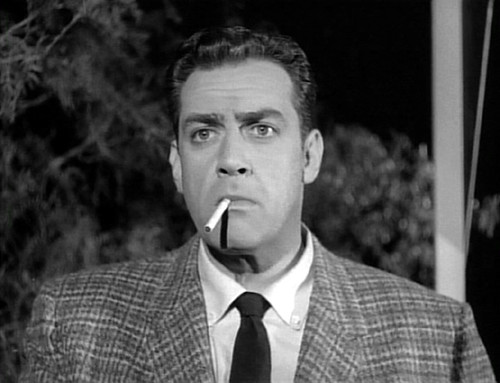

7. Della Street is smart, attractive, efficient and darn good at her job. She's Perry's confidential secretary and sometimes investigator when a woman is needed. Perry relies on her discretion, intuition and her bravery. She is also clearly Perry's equal and he treats her as such. She also works just as hard as Perry and never complains when they have to stay late at the office or when she has to get out of bed at 3 in the morning in order to do something. Perry and Della clearly have a strong emotional relationship and would also be termed "friends with benefits" nowadays, although that aspect isn't really shown in the series but is in the books.
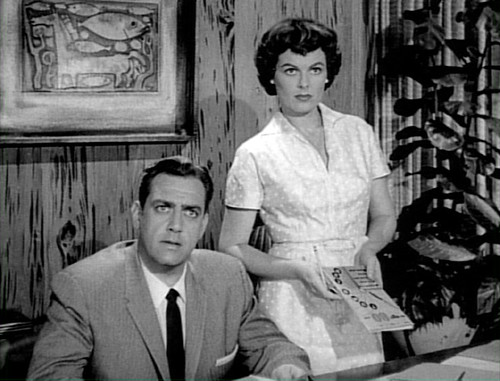
8. Della dresses extremely well and appropriately for her job. Since the show went on for so long, you can really see the changes in fashion and hair through her and how she chooses to incorporate Sixties fashions in her wardrobe and just how slowly it takes for changes in fashion to filter down from designers and magazines. Barbara Hale, who played Della, insisted upon selecting her own costumes from off the rack and on doing so on the average weekly salary of the average secretary, which was $60-70 weekly in 1959, even though Della would be paid considerably more. So, watching Della is like looking at old photos of real people and not magazines and you can see what department stores in LA were actually offering then. Plus you can also see the frequency in which she repeated an outfit and what she wore it with.
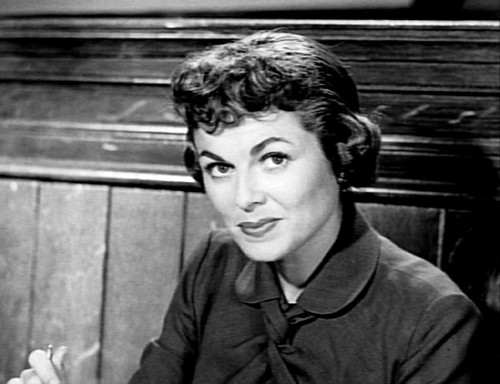

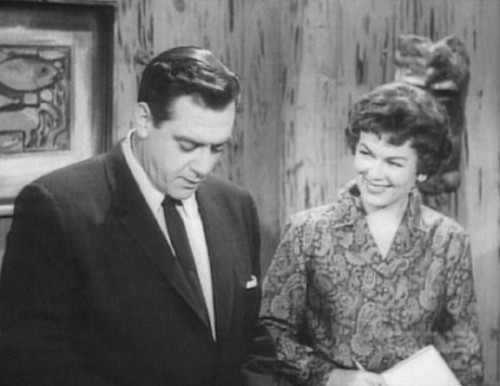
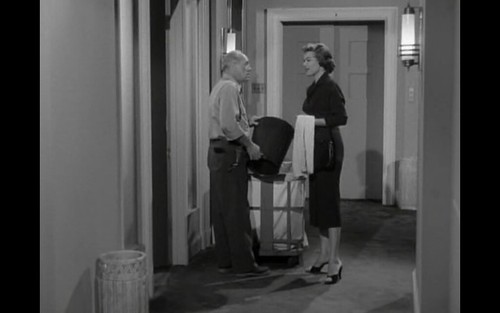
She wears those mules a lot in the early seasons.
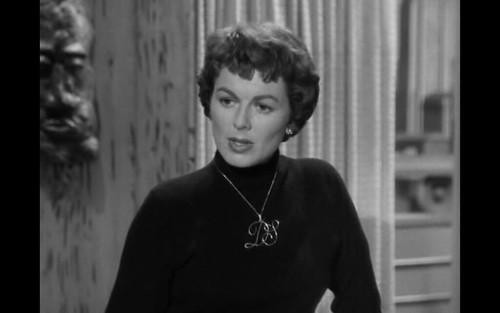
And that's her signature pendent. How cool is that!

9. If you thought Perry Mason was cool, then Paul Drake is really cool! He was played by William Hopper (son of Hedda) who was prematurely greying, but still the snappy dressed man-about-town and often seen with a Winston hanging out of his mouth and driving a giant Thunderbird. He also likes to flirt with the ladies and check them out, but he doesn't leer. He always greets Della with "Hiya beautiful". Paul Drake is the head of the Paul Drake Detective Agency, which is on the same floor as Perry's office. Perry is his friend and his biggest client. Paul isn't that much of a detective, since Perry solves the murder every week (the show wasn't called Paul Drake). But Paul does have a lot of contacts and a lot of operatives working for him in order to tail a guy for get information or records. Paul is often worried about losing his license, since he doesn't have the same rights to client confidentiality that Perry has. He's also worried about when he gets to eat, which is even less frequently than Perry, since Perry usually has him occupied with the case's legwork.
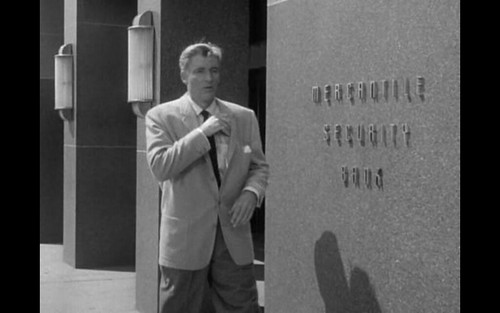
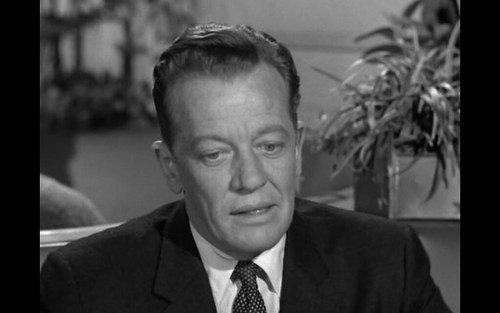
10. For most of the show's trials, Perry had to go up against Hamilton Burger (Ham Burger, get it?) the District Attorney, who's job it was to lose to Perry every week. He tried his best to get information that Perry hadn't discovered or a surprise witness or two. But most of the time, Burger just said "Objection! Incompetent, irrelevant and immaterial" to which the viewer would shout "shut up Burger" at the screen. It wasn't that he was a bad lawyer, he just wasn't Perry. But Burger was really crabby, but honest and just as interested as Perry was in seeing justice done, which is why you can always see the exact moment when he realized that Perry had the case solved and wanted to bang his head on the desk. Besides, Perry and Burger were sort of friends, since Perry was so darn good at the law and he always paid for lunch.
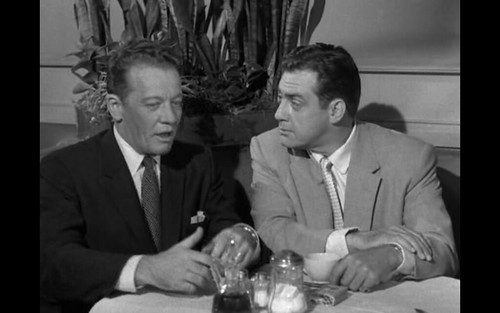
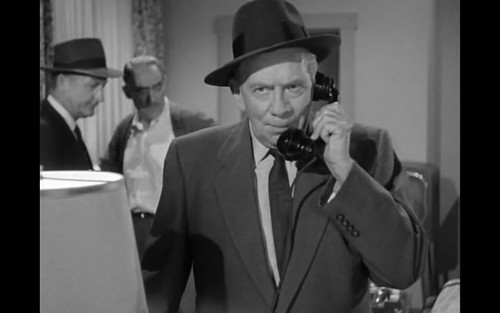
11. Lt. Tragg of Homicide was exactly Perry's nemesis, but he was always convinced that this timehe got Perry beat. He often mysteriously appeared at the door, just in time to grab the evidence that Perry and Paul had just found or to charge Perry's client with Murder One, very full of himself. And sometimes, Perry would be phoning his client and Tragg would answer and tell Perry of the dead body he just found and did he have any information of Homicide. He always seems to enjoy arresting Perry's client, only to look embarrassed when Perry solves the case.
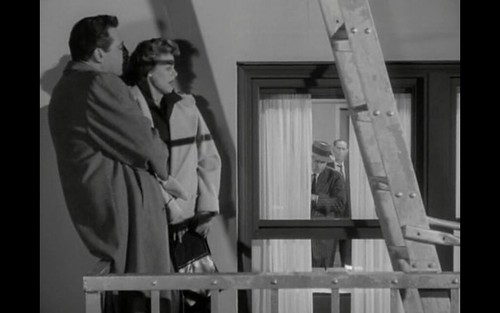
12. The filming is excellent. Full of lots of clever edits, use of light and shade and shadows, close ups of evidence or objects we are supposed to notice. A lot of the camera work clearly takes it's cue from Film Noir, with angles telling us more about the characters and their reaction and emotions than any of their lines could tell us, like in this scene:
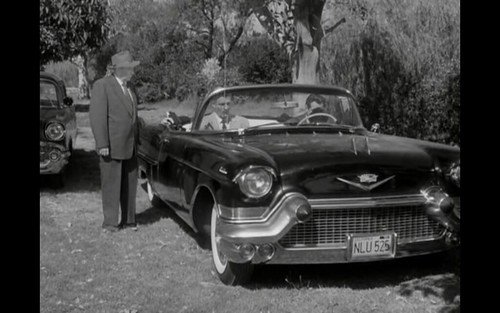
13. The cars were just unbelievable. Massive boats on wheels with terrible brakes but they do look cool. Plus you get to see how a variety people drove when they'd never heard of seat belts or locking their doors. And there's the convenient plot device of having everyone display the registration card on the steering wheel.
14. Obviously the costumes in Mad Men are stunning and painstakingly made. However, they are costumes and they always look just a little too perfect, like they were copied from one of Taschen's Ad books. However, in Perry Mason, the actors wear normal clothes. Even when the stories are set in the country or the characters wear casual clothes, they do have some wear and tear on them, or at least some wrinkles. Plus you get to see how people dressed depending on their social status or work. And there are a lot more hats and gloves, especially veiled hats deliberately chosen for specific characters and flowered hats for completely different characters.
15. Mad Men only shows you how advertising worked in the Sixties. The same is true for most other period pieces, they usually only show one aspect of life. Perry Mason is a social document of what life was like in LA fifty years ago. In setting up and solving the crimes, the cameras show how different companies or small towns operated. There is a huge variety of settings in the series, from investment firms, gold mining, banking, property management, seedy bars, restaurants, gambling, small businesses, general offices, lawyer's offices and of course fashion houses. Plus everything is just as it was, since there is no need to recreate anything.
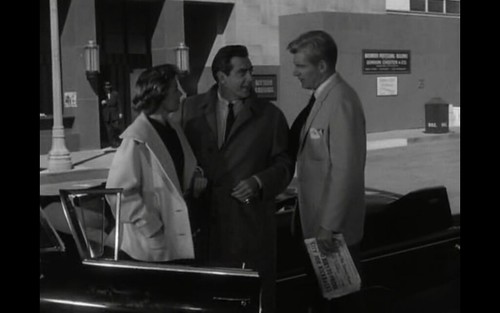
16. You know that every week, these three would solve the crime and everything would be alright in the end, without a personal crisis appearing as a result of working on the case or to create a cliffhanger to be resolved (or not) in the season finale.

6 comments:
Perry Mason is SO MUCH better than Mad Men! x
I wholeheartedly agree! What a great post - I'll have to pull out Season 1 Vol. 1 and start at the beginning.
Of course I am going to agree with that.
I SO enjoyed your tribute to dear Perry! (Do you know the Black Sabbath song about Perry Mason?) I was born in 1951 and watched many of the original episodes with my dad. My husband and I are gradually buying all the episodes on DVD and watching them just one a week. He used to watch reruns as a teen while he babysat his younger brother - so many connections for me. I will also recommend Paydirt by Erle Gardner, something different from Perry, gold prospecting desert stories mostly but I just adore them, as little philosophical treatises. I work for an attorney who decided to become a lawyer because of Perry - sadly real law practice is a bit different, but Perry's good traits are pretty good to aim for no matter what you are doing.
I just adore your blog - all I have read of it so far anyway!
Excellent review of multiple important parts of why Perry Mason the TV shows endures. It's a daily noon time tradition for me, lunch with Perry, even on the weekends. I wish whomever is putting out the season-by-season DVD would get the whole job done. Better yet, I wish tv.com or someone on the web would post all the episodes!
I full-heartedly agree. And I had a ball reading this. Thanks so much, dear. :)
Especially for the endearing lines about Della Street, her appropriate and realistic wardrobe (hooray to the lovely Barbara Hale and a production that granted her to have a say in that matter), her work ethics and darling (in and out of office) relationship with her boss. :)
The mention of Della's signature pendent made me smile. I also always loved that dress with her embroidered initials. :) So pretty.
Oh how I miss characters like her and Perry and Paul (both very cool indeed) these days. So classy and so rare.
Post a Comment